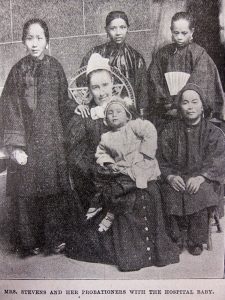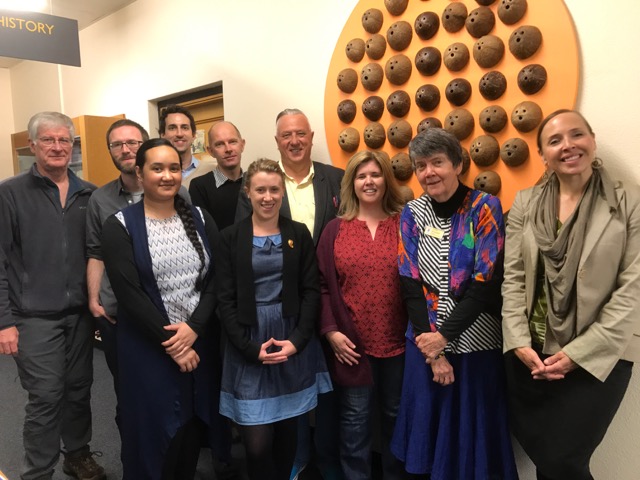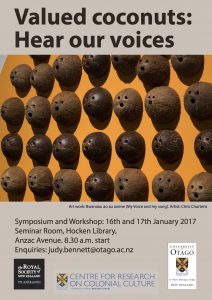New Book on Religious Childhoods
Creating Religious Childhoods in Anglo-world and British Colonial Contexts, 1800-1950 is a new co-edited collection from Centre member, Hugh Morrison, and Mary Clare Martin (Greenwich University, UK). This new book, published by Routledge, features children and religion in colonial society contexts such as New Zealand, and aims to develop greater understanding of religion as a critical element of modern children’s and young people’s history.

‘Mrs Stevens and her probationers with the hospital baby’, alongside article by Mary Budden, ‘Almora Christian Families’, in LMS Chronicle, July 1895, p. 182 (from Chapter 1, p. 27)
Arguing that religion was an abiding influence (positive, negative and benign) among British-world children throughout the nineteenth century and much of the twentieth, the book places ‘religion’ at the centre of analysis and discussion, while at the same time positioning the religious factor within a broader social and cultural framework. Essays written by an international grouping of scholars focus on a range of geographical settings: America, Australia, Britain, Canada, Fiji, India, New Zealand, South Africa and the South Pacific. The various contexts within which religion shaped childhood in these settings – mission fields, churches, families, communities, institutions, camps, schools and youth movements – are treated as ‘sites’ in which religion contributed to identity formation, albeit in different ways relating to such factors as empire, nation, gender, race, disability and denomination. Chapters on New Zealand include: an examination of southern Dunedin’s religious identity; children’s religious literature published by A.H. & A.W. Reed; and the ways in which religious identity was conflated with civic qualities of sacrifice and service.
Valued Coconuts
Scholars in Pacific history and culture met to share their knowledge on the use and economies of the coconut in a symposium on Monday and Tuesday this week in Dunedin, the first event in what looks like a busy year for the Centre. Professor Judy Bennett organised and hosted the Valued Coconuts: Hear Our Voices symposium and workshop as part of her Marsden project, Constant Coconuts: A History of a Versatile Commodity in the Pacific, and with support from CROCC.

From left: Steve Talley, Josh Levy, Toaga Alefosio, Holger Droessler, Adrian Muckle, Kate Stevens, Lachy Paterson, Angela Wanhalla, Judy Bennett and April Henderson.
Valued Coconuts was a pre-read workshop featuring six papers. April Henderson and Toaga Alefosio’s (Victoria University of Wellington), On Skin and Bone: Samoan Coconut Oil in Indigenous Practice discussed how coconut oil is used in the continuing Samoan practices of fofō (healing massage), samaga (tattooing) and liutofaga (cleaning of ancestors’ bones) and the meaning for people today. This paper comes of out of summer scholarship for Toanga (who will be an Honours student this year) and April’s current research on virgin coconut oil use, “Kernals of Hope: Following Coconut Commodities from the Pacific to the West” supported by a Royal Society of New Zealand Marsden grant. In the second paper, Wasting coconuts? Consumption versus commerce in Wallis and Futuna, Kate Stevens discussed how French colonisers’ desire for scientific production of copra clashed with the Indigenous people’s views on the value of coconuts. Kate is a postdoc in Otago’s Department of History and Art History, working with Judy on their Marsden project.
Josh Levy is a PhD student at University of Illinois, Urbana-Champaign, who is researching the successive colonial regimes on Pohnpei through food history. His paper, Ideal coconut country: Persuasive coconuts and the scientific plantation in Pohnpei, Micronesia, looked at the German colonial period and the effects of copra production on the Pohnpeian population. Steve Talley, an Otago PhD student’s paper set to Defining indigenous entrepreneurship in the New Hebrides copra trade, and how the opportunities and constraints of the French and British rule moderated the Indigenous peoples’ engagement in the coconut trade.
Holger Droessler‘s Coconuts in Samoa explored how the cultivation of coconuts and production of copra mediated the German colonisers’ attitudes to Samoans, and how Samoans were able to maintain a subsistence economy despite the German desire for greater productivity. Holger is a Visiting Assistant Professor of History at Bard College in New York state. In the last paper, Judy Bennett’s Voices of Rotuma: Enduring Refrain examined the copra trade of Rotuma both in the colonial and post-colonial eras and tensions brought about through the necessity of having to ship its copra through Fiji.
Centre members, Angela Wanhalla and Lachy Paterson, acted as commentators for these papers alongside Adrian Muckle from Victoria University of Wellington. The format of the symposium allowed for extensive discussion of the papers; the plan at this stage is for all the papers to be incorporated into a special journal issue. Thanks to the Hocken Collections for providing the venue for the event, and for the tour of some of their Pacific material. Thanks also to the Otago Museum for a tour of some of its coconut-related holdings.
Orphanages, Residential Schools, Colonial Gossip
All of these topics will be discussed at a half-day symposium on “Colonial Families: New Perspectives” taking place on Thursday 20th August from 9-12 in Central Library Seminar Room 3, University of Otago. This event is sponsored by the Centre for Research on Colonial Culture, with support from a Royal Society of New Zealand Rutherford Discovery Fellowship and features four speakers who will present new research into the history of the family in Canada, New Zealand and the Pacific:
Laura Ishiguro’s (University of British Columbia) research is trans-imperial and global in scope. She will speak about colonialism, mobility, and intimacy in the “long” nineteenth century through the story of one Metis family from British Columbia. Her talk draws upon her SSHRC-funded research project, “Settler colonialism, global families, and the making of British Columbia, 1849-1871″ (Insight Development Grant 2014-16). She guest-edited a 2013 issue of the Journal of Colonialism and Colonial History on “Imperial Relations: Histories of Family in the British Empire,” and in it called for a rethinking of the meanings of, and relationships between, family, intimacy, and imperialism.
Crystal Fraser (University of Alberta) is a high-profile young Gwich’in scholar who is undertaking research on the impacts of colonialism on her home community, Inuvik, located in northern Canada. She has been identified as “one of the most important Canadian historians of the next generation” whose research on residential schools, gender, and sexuality in Gwich’in society and the Canadian North is “actively shifting both fields as aboriginal people and northerners start writing and directing research in their own history on their own terms”. She is also a leading voice in Indigenous social media, which included hosting @IndigenousXca where she discussed racism in Canadian academia. Crystal will speak about the current debates within Canadian history and society about residential schooling.
Jennifer Ashton (Auckland) will speak about family, race and respectability in northern New Zealand during the nineteenth century. Jennifer’s talk draws from her recently published, and highly regarded first book, At the Margin of Empire: John Webster and Hokianga, 1841-1900 that “takes us into Hokianga to reveal how the evolving intimate relationships and economic transactions of everyday life reflected larger shifts in colonial power” through a biography of the trader and colonist John Webster and his networks.
Erica Newman (Otago) will talk about her original and exciting doctoral research on orphanages and adoption in colonial Fiji. Erica’s research in this area has been recognized internationally in the form of invitations to participate in pre-read workshops at the Berkshire Conference of Women Historians, and an invited publication on her previous work on Māori adoption in the highly regarded American Indian Quarterly.
Contact Dr. Angela Wanhalla (angela.wanhalla@otago.ac.nz) for further information about this free event.


